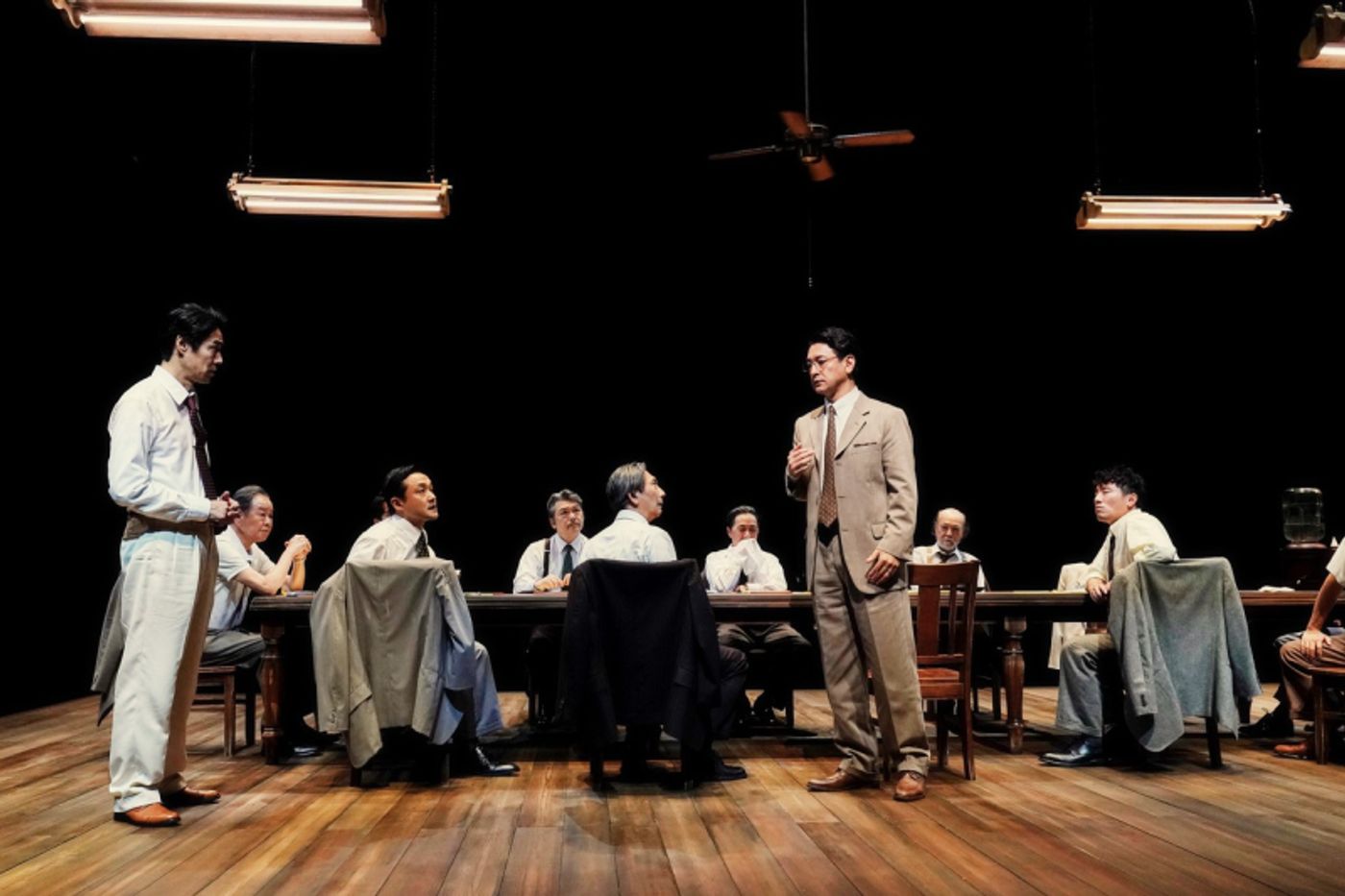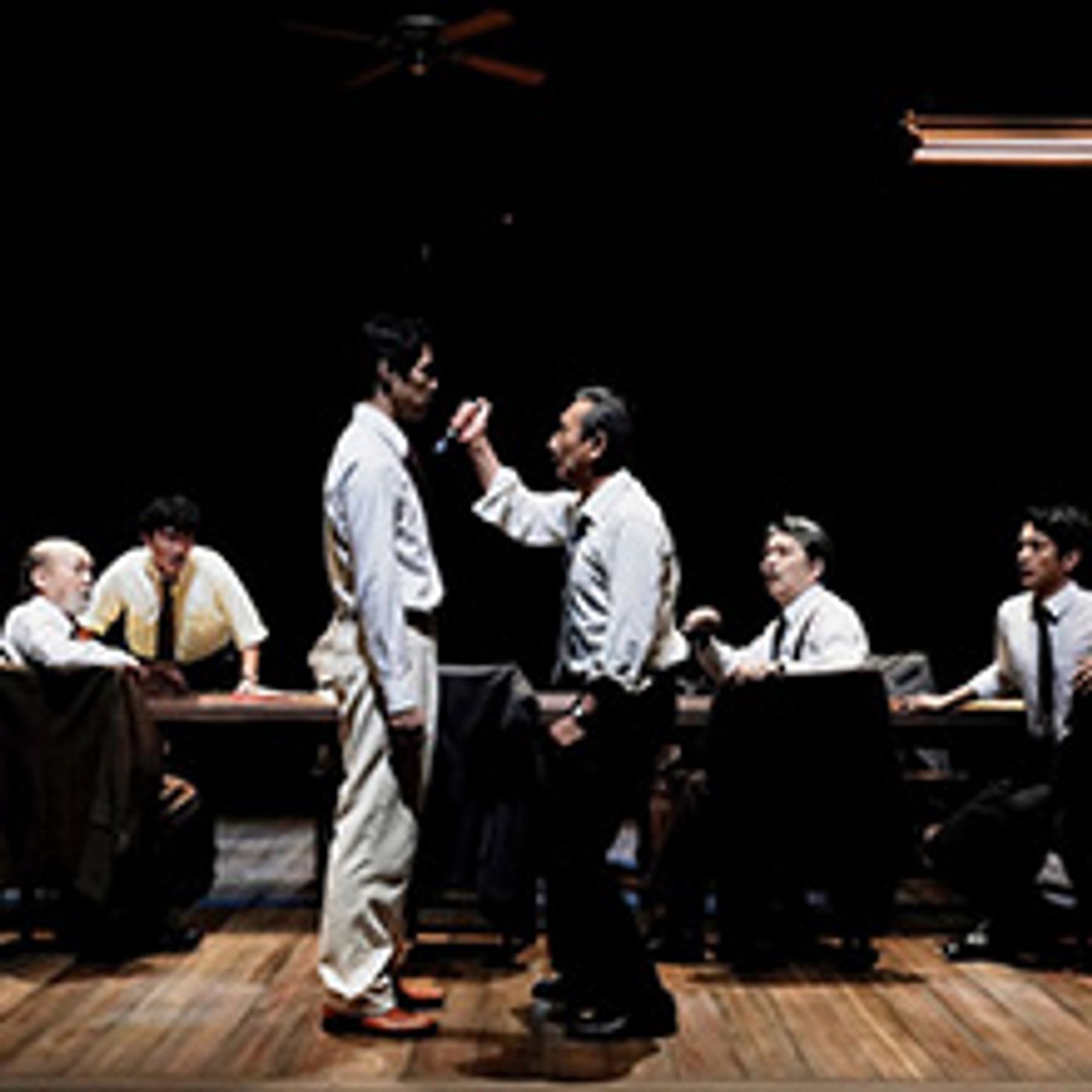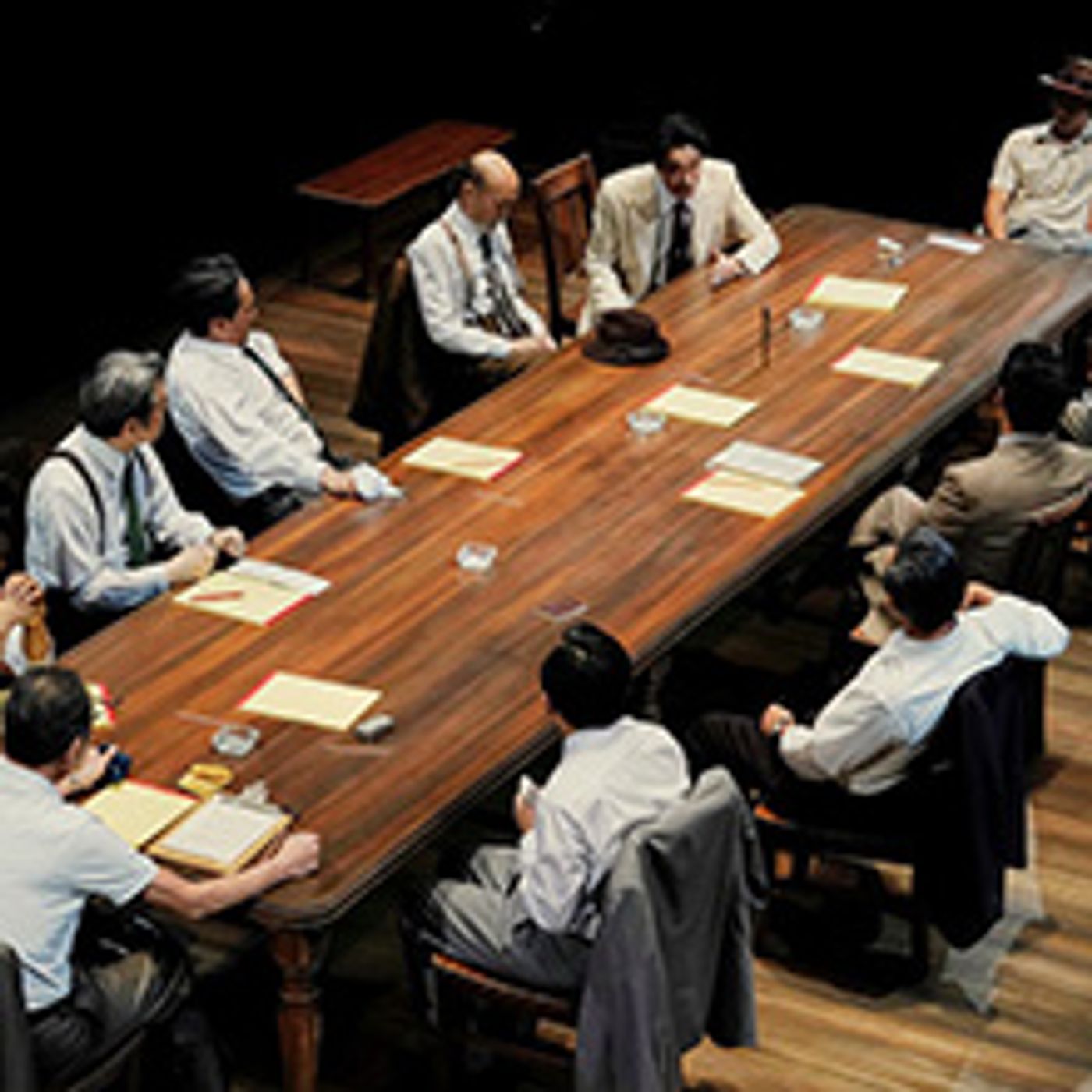Interview: Peter McKintosh Talks TWELVE ANGRY MEN at Bunkamura Theatre Cocoon
The Olivier Award-winning scenic and costume designer discusses his new Japanese production

Award-winning scenic and costume designer Peter McKintosh was meant to be working on a production of 12 Angry Men at the Bunkamura Theatre Cocoon in Tokyo until Covid-19 hit.
But with social distancing now in place, the show is going ahead, with McKintosh working his magic virtually instead.
He chats about working on an international production during the pandemic, his career highlights, and his freelance advocacy group.
What's it been like working on 12 Angry Men, a production in Tokyo, during the pandemic?
It was quite a long time into lockdown that I found out, and even then, we weren't sure whether we were going to be able to go ahead or not. There was a question about whether there would be quarantine if we did go, so that would be an extra two weeks. At every stage it was vague to say the least because, as you know, both in this country and in Japan, the guidelines and the rules are changing literally daily.
So even when we found out it was going to happen, it wasn't clear how it was going to happen. It only became clearer as we got closer that myself and the director weren't going to get there, and we may never see it. It was a drip-drip realisation that it was just something we could help with in the end, really. We obviously wanted them to be able to put their show on as best as they possibly could with us on the other side of the world.
Did your work process change when working virtually?
In some ways, it didn't change except that it was virtual. So, we just had to Zoom or Skype or FaceTime ways of doing workshop visits and costume fittings. Part of it was the time difference as well. Most of it was done between 8am and 1pm, which was evening time in Japan. Sometimes I had to get up a bit earlier - I woke up at 6am to do some fittings and to look at a costume parade.
I think it was just about being really organised and trusting people who I didn't know very well: trusting that they knew what they were doing, and that we could all communicate well enough to get it done.
They were brilliant, they were absolutely brilliant. Actually it was much easier for me than it was for them, because they were filtering all of my comments through their own lenses. So, if I gave a paint note about something not being broken down enough or looking real enough or whatever, then all of that had to be translated into Japanese and then translated into how the painters work. It was all about finding new ways to work that will serve everybody.
For anybody who makes theatre from a distance in the future, I think we're learning an awful lot right now, and it's about how much we can do without being in the country. It's frustrating not to be able to see the real thing, but it would be more frustrating for the show not to have happened at all.

What was the biggest challenge of working virtually?
I guess feeling like you're part of the team was the biggest challenge, because you were only ever a face in a Zoom box and I deal with lots of people - set builders and prop people and costume people - and I usually see all of those people.
In this process, I really only ever saw one person from each department and they were all brilliant, but you never got to feel that you were able to be grateful and thank all the other people for what they did. To feel like you were appreciating all of those things was, for me, the hardest thing. I think a big part of the job is to encourage people to do their best work, and when you have limited time and vocabulary, all you ever really do is end up being quite precise about things - it's quite easy to forget to pause and praise people for where they've got to.
What drew you to work on this production?
I really wanted to work in Japan. I love Japan, I've worked there twice before, and I really wanted to go back. Part of doing the show was that I was going to have a holiday during the rehearsal period. It was going to be a big holiday, and it was going to be really exciting because I've never travelled around Japan.
It's a brilliant play and also it has historical context in this instance because up until 2009, the Japanese didn't have trial by jury at all. So, this play was first done in Japan just after trial by jury came in there and for them it was a revelation - it's so much more pertinent to them.
I also love working with Lindsay Posner, the director. Even we, during this process, didn't meet up - we only ever met in the Zoom rooms.
It was a really lovely job. It would have come at the end of a whole run of summer work, all of which didn't happen. Ironically, it is the only actual physical play I've done since February, and for that I'm incredibly grateful. It was so lovely to be reminded of what we do, albeit through a different filter.
Have you got any standout moments from this production?
I have two moments.
The first dress rehearsal. The actors had always rehearsed in clear face masks, all the way through - from the beginning in the read through right up until the first dress rehearsal. It was going to be performed without face masks; there was just a moment when they had to decide when that would be for the first time. We had a series of dress rehearsals, so it was the first of about three dress rehearsals, and they decided right then and there that they would take their masks off and do the show. So, for the first time, we saw the play as it was going to be, and it was incredibly moving. It was surprisingly touching to see them. And as it turned out, it was a real shock to them to perform the play without the masks, because they were so used to them.
And on the opening night when there was finally an audience - albeit a socially distant audience - in the theatre, the empty theatre that we'd been looking at for two weeks. That was really, really moving as well - I felt like we'd all really achieved something by working together, despite the distance.

Experiencing theatre in itself is quite emotional at the moment, isn't it?
Totally, yeah. I felt the same when I went to Regent's Park Open Air Theatre to see Jesus Christ Superstar recently. I've done six shows there and they've all been musicals, so they all fitted this slot.
So, for me, it's a real set experience because this time of year is all about Regent's Park. We went to see it and I was overcome with pride for everybody involved, a lot of whom are my friends. It's an incredible thing that they've achieved, and also the control they had over their Covid regulations; they were so careful.
It just makes me laugh in a way when people say, "How can people go back to theatres? It's so risky." In this business, we are used to controlling audiences: we're quite good at getting people into seats, at making sure people do what they're supposed to do in the theatre. It's not like a pub where people after three drinks can't stand up. It's what we do, and we should remember that it's part of our skill - and that's what I thought about Regent's Park. Every single beat of it was pitch perfect, because somebody had thought about it so much. At the beginning, I burst into tears, because I thought it's not only acknowledging that it's a piece of theatre, but you're acknowledging the situation that we're all in and you're making it resonate now.
You look around the audience and by the end of it, having 300 people with masks on clap and give a standing ovation - of course, it doesn't sound like 1,200 people giving a standing ovation, but even as I speak about it, I get quite emotional at the sense of shared experience between the people on the stage who were clearly as grateful to the people in the audience, as the audience were for the people on the stage.
It was an amazing experience, and that's what I felt to a degree in Tokyo. The audiences that I've worked with in Tokyo historically are quite restrained with their applause and appreciation, and we got three curtain calls on our opening night - and that's apparently a big deal in Japan. I think everybody is hungry to get back into the theatre.
What's it like working on international productions? Is it any different in terms of expectations from the West End?
I don't think so; my expectations are always the same. I had some very sweet letters the day after 12 Angry Men had opened from people who'd been involved in it. They were saying they were very nervous about working with me and working on this show and not being able to either understand or gauge what I was trying to say, and they're incredibly grateful that I'd made them feel like they had.
As I was saying earlier, part of the job is to make everybody feel like we're all getting it right. So, I don't think it is much different in terms of expectations or anything; language is always a barrier, but it also forces you to be more specific and articulate.
You've worked on some incredible shows. What's been your career highlights?
One of my career highlights is obviously The 39 Steps, because it was a watershed moment for me and my career. It went all over the world - and I did that in Japan - so I saw a lot of the world and it was always interesting to see how other people made the same play, but for their own cultures and audiences. It was an adventure that went on for ten years, so I suppose that's definitely a career highlight.
Some of the stuff I did in Regent's Park too. To see 1,200 people watching a musical in the park is always a special experience.
And actually, funnily enough, one of the last things I did before lockdown was a production of Funny Girl in Paris. I went back to Paris for the closing night and took my mum to see it, and that was a pretty amazing experience and production. We had a fantastic leading lady called Christina Bianco who's brilliant, and Paris took her and our show to their hearts. Two weeks after it closed, everywhere was in lockdown, and the lovely thing about the show was that it actually got to close - it finished its run. It just felt like all the stars aligned to make that one of the perfect jobs.

What's the most challenging thing about working in theatre design?
Working with new people is always challenging - working with new directors and new energy. But I think when it's good, when the job is good, it's always challenging and that is what I love about it. So, I wouldn't want ever not to be challenged. Finding new ways of telling stories is the best challenge.
How do you find inspiration when you're working on a new show?
It just depends what it is really. Reading the script and reading it again, and then feeling something about it, even if you can't put your finger on it. Talking to the director, about what you don't want as much as what you do want. And if you've seen other productions - if it's not a new piece - actively trying to avoid clichés.
Is there any particular show that you'd love to work on?
I used to have. I don't answer that question anymore because I feel like it's a bit tempting fate. There are shows that I thought I would want to design, and there have since been very big productions of them, so I know those ships have probably sailed.
Something like Follies I would love to do, but I know that very few places in the world have the money to do Follies the way it should be done - like Vicki Mortimer designed it at the National, and she did such a beautiful job. You just go, 'We don't need to see anyone else's version of that for a while - she pretty much nailed it'.
I used to have a hit list of shows, but now I'm just very grateful to do the ones I'm doing. I've been very lucky to design shows that I've wanted to do and equally some of the shows that I never thought I really wanted to do, which turned out to be shows that I'm incredibly fond of because the team made something much more special of it than it first looked like on paper.
What else have you been doing during lockdown?
I have been doing two things in lockdown. I've been cutting up old bits of my models from the past and framing them, and I sold 20 to charity. So, I've kind of been keeping myself busy by repurposing my own work and therefore giving myself something to do.
I've also been involved in this group called Freelancers Make Theatre Work. I'm one of the founding members of that group and we have been working incredibly hard. It's like a fulltime job, but in a good way.
I've been massively out of my skillset, doing all sorts of things that I never thought or knew I could do. So I think when we go back to work, I'll have something in my life that I didn't have before, which is this incredibly active advocacy group that has been fighting and championing freelancers who, up until now, have had nobody speaking for them at all.
Can you tell us a bit more about Freelancers Make Theatre Work?
It's a group that came together around two months into lockdown, who realised that freelancers were not being included in the conversations that were happening about theatre. Not in a malicious way, just everyone was focused on their buildings and things, so a lot of freelance theatre-makers came together to make this group.
We decided to start with a website to put together resources about information, how people can write to their MPs, how people could apply for funding or just money that kept them going from day to day - for grants or for signing on, anything at all - and there's a whole wellbeing section about mental health too. We just put as many resources as we could in one place to help freelancers negotiate the things that were coming and are still coming.
It's not going to get easier, especially when the nights get cold and dark and we go back into lockdown in various variations. People will realise that this six months of not working is just going to stretch on way beyond six months for a lot of people. So, what we're trying to do is support those freelancers as best as we possibly can until they can get back to work, with as much information as we can about all of the things that are happening.
12 Angry Men is running at the Bunkamura Theatre Cocoon, Tokyo, until 4 October
Photo credits: Andrew Mason, Shinji Hosono/Bunkamura
Videos

